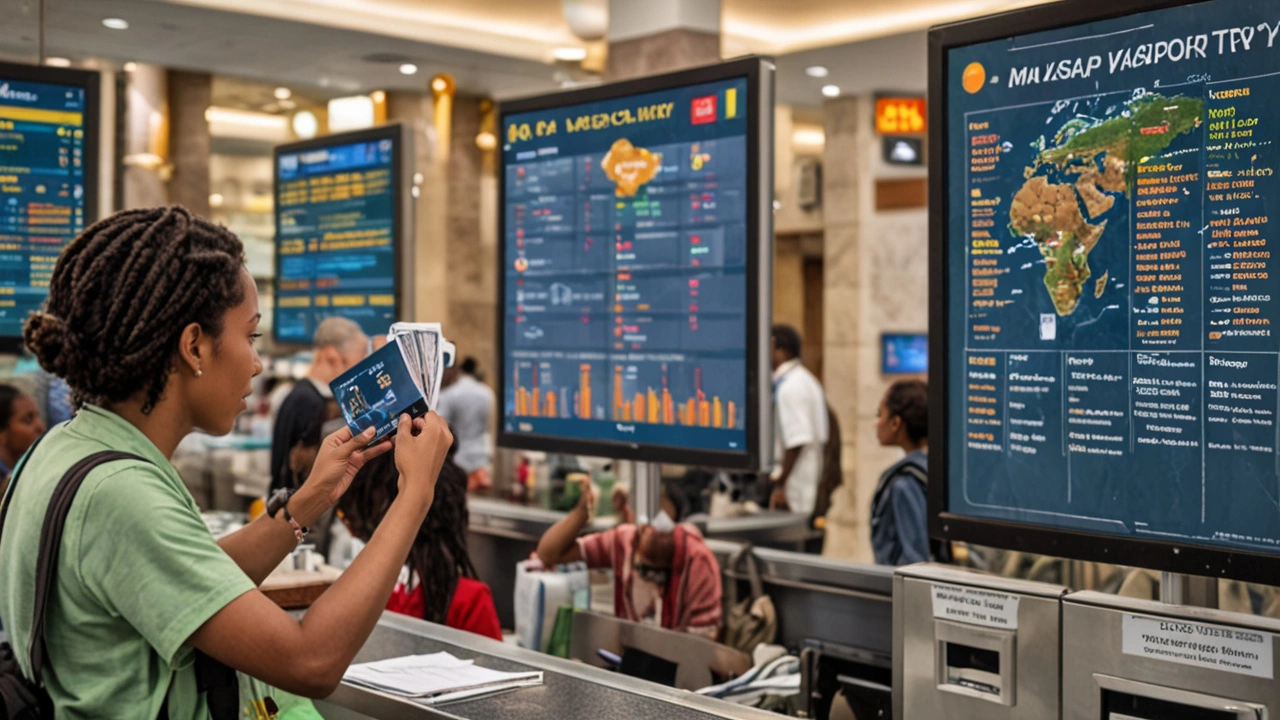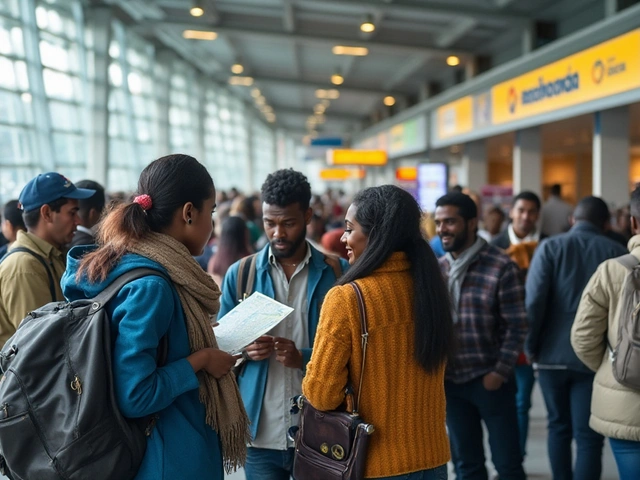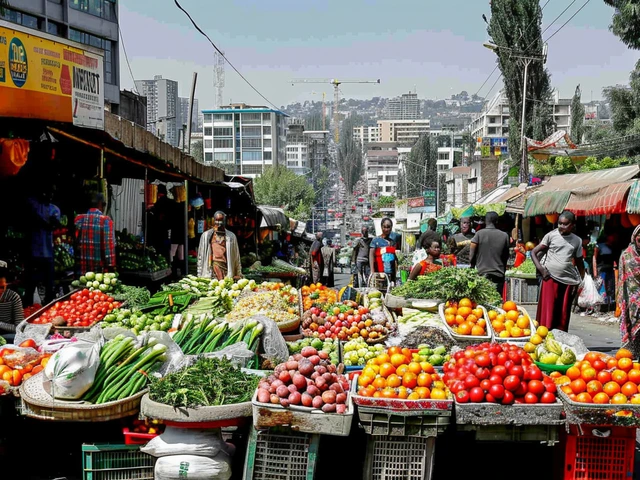Ever wondered how long you can stay in Ethiopia as a foreigner? Whether you're traveling for adventure, business, or cultural exploration, knowing the visa details is crucial. Here, we break down the types of visas available, their durations, and other essential tips for your visit.
Ethiopia offers various visa options, from tourist visas to business visas, each with specific stay regulations. Understanding these can help you maximize your experience in this rich and diverse country. Let's dive into the specifics to make your trip planning smoother.
- Visa Types and Duration
- Tourist Visa
- Business Visa
- Visa on Arrival
- Extension of Stay
- Important Tips and Facts
Visa Types and Duration
Understanding the visa types and their durations is the first step for any foreigner planning a stay in Ethiopia. The Ethiopian government offers several types of visas depending on the nature and purpose of your visit. Each visa type comes with its own set of rules regarding the length of stay and eligibility requirements.
The Tourist Visa is the most common option for travelers who wish to explore Ethiopia's landscapes, culture, and historical sites. This visa typically allows a stay of 30 days. For those who want a bit more time to soak in the local experiences, there’s an option to apply for a 90-day tourist visa. However, it’s essential to note that this type of visa does not permit any form of employment during your stay.
Business Visas cater to individuals who are traveling for work-related purposes. Depending on the business commitments and the agreements between the host and the Ethiopian government, the validity can range from 30 days to a year. Business visas are versatile as they can be single-entry or multiple-entry, giving professionals the flexibility they might require.
Special Circumstances
For visitors coming from countries that have special agreements with Ethiopia, there’s an option for a visa on arrival. This visa is granted for a 30-day stay but can be extended if necessary. Nationals from around 30 countries are eligible for visa on arrival, which makes the travel process more convenient.
An emerging trend among travelers is opting for eVisas, which can be applied for online before the trip. This digital convenience has made it easier and faster for tourists and business persons alike to get their travel documents sorted. The eVisa can cover up to 90 days, depending on your needs.
According to the Ethiopian Immigration Nationality and Vital Events Agency, "The eVisa has significantly reduced the processing time, benefiting thousands of international travelers annually."
Extension Options
If you fall in love with the country and your visa duration isn’t enough, you have the option to extend your stay. The key is to apply for an extension before your current visa expires. Tourist visas can be extended for 30 additional days, while business visas offer more flexibility in terms of extension duration. Visit the main immigration office in Addis Ababa for this service, and ensure you have all necessary documents on hand to avoid any delays.
These visa types and durations are designed to accommodate the diverse needs of travelers. No matter what brings you to Ethiopia, understanding these requirements ensures a seamless and enjoyable visit. The beautiful landscapes, rich history, and welcoming people all await you as you navigate through your visa options.
Tourist Visa
Traveling to Ethiopia as a tourist? You'll need a tourist visa, which is quite straightforward to acquire. Foreigners can apply for a tourist visa either online or upon arrival. The great news is that Ethiopian authorities have streamlined the visa process to encourage more tourism.
The Ethiopian e-Visa allows travelers to obtain their visa electronically before even setting foot in the country. This is a handy option for those who like to have everything sorted beforehand. You're also likely to save time queuing at the airport upon arrival. The e-Visa usually comes in two variants: a 30-day single entry and a 90-day single entry.
For those who decide last minute or have spontaneous travel plans, the visa on arrival is a more flexible alternative. Available exclusively at Bole International Airport in Addis Ababa, the visa on arrival lets you stay for up to 30 days. Just ensure your passport is valid for at least six months from your date of entry.
While most travelers opt for the 30-day visa, if you wish to stay longer, you can opt for the 90-day visa. Both options are issued as single entry, which means if you exit Ethiopia, you would need a new visa to re-enter. Always remember to check the latest updates and guidelines on the official Ethiopian immigration website before you travel.
Ethiopia's bustling culture and historical richness are truly captivating. UNESCO sites like the rock-hewn churches of Lalibela and the ancient city of Aksum offer an unforgettable experience. And let's not forget the unparalleled coffee culture! Whether you're exploring the Omo Valley tribes or hiking in the Simien Mountains, there's always something incredible awaiting.
Amidst these wonders, adhering to visa regulations is critical. Overstaying your visa can result in fines or even deportation. It's a good practice to keep a copy of your visa and entry stamp with you during travels, just in case authorities ask for verification.
"Ethiopia's rich heritage and diverse population make it a unique destination for travelers with an adventurous spirit" - Lonely Planet.
For those wanting more flexibility, it's possible to extend your tourist visa. This process is done at the Ethiopian Immigration, Nationality and Vital Events Agency in Addis Ababa. It's advisable to apply for an extension a few days before your visa expires. You’ll need to fill out an application form and provide a passport-sized photo, copies of your passport, and the current visa. A small fee is required, which varies based on the length of the extension.

Business Visa
If you're heading to Ethiopia for business purposes, you will need to apply for a business visa. This type of visa is designed especially for individuals involved in professional endeavors, business meetings, conferences, or other business-related activities. Ethiopia is becoming a popular destination for business travelers due to its growing economy and opportunities.
Applying for a business visa involves a few important steps. To begin, you must have an invitation from a company or organization based in Ethiopia. This invitation should clearly state the purpose of your visit, the expected duration of your stay, and other relevant details. Alongside the invitation letter, you will also need to submit a cover letter from your employer or sponsoring company, details of your itinerary, and a valid passport with at least six months' validity.
The standard business visa in Ethiopia allows you to stay for up to 30 days. However, if your business activities require a longer stay, it's possible to apply for an extension once you are in the country. Extensions can be obtained through the Ethiopian Immigration and Nationality Affairs Main Department in Addis Ababa. It's advisable to apply for an extension well before your initial visa expires to avoid any complications.
Many business travelers opt to seek assistance from local business partners or sponsors when navigating the visa process. This can not only streamline the application process but also ensure compliance with Ethiopia's visa regulations. As always, ensure that your documents are complete and accurately filled out to prevent any delays or rejections.
According to the Ethiopian Investment Commission, "Ethiopia offers a plethora of opportunities for foreign investors, particularly in sectors like agribusiness, manufacturing, and energy." This makes a business trip to Ethiopia not just a necessity but a potentially lucrative venture.
Once you have obtained your business visa, it's essential to remain aware of the regulations tied to it. Engaging in activities outside of what your visa permits, such as tourist activities or employment, can lead to penalties or even deportation. Therefore, staying informed and adhering to your visa conditions is crucial during your stay.
An interesting fact to note is that Ethiopia is a member of the Common Market for Eastern and Southern Africa (COMESA). This affiliation can provide additional benefits for business travelers from COMESA member states, such as reduced tariffs and more straightforward customs procedures. Understanding these regional agreements can significantly benefit your business operations in Ethiopia.
Preparing for a business trip to Ethiopia isn't just about securing the right visa; it's also about familiarizing yourself with the local business culture. Ethiopians place a high value on personal relationships and trust. As such, building a rapport with your local contacts can go a long way in facilitating business dealings. It's often recommended to learn a few basic phrases in Amharic, the official language, as a gesture of goodwill and respect.
Visa on Arrival
One of the most convenient options for foreigner travelers heading to Ethiopia is the Visa on Arrival system. This type of visa is perfect for those spontaneous travelers who decided last minute to explore the beauty and cultural richness of Ethiopia without going through the pre-arrival visa application process. Available at the Bole International Airport in Addis Ababa, this visa option can save you time and ensure a hassle-free entry into the country.
To obtain a Visa on Arrival, you will need a few essential documents. Make sure you have a valid passport with at least six months remaining and a return or onward ticket. It's important to note that this visa usually allows a stay of up to 30 days. However, you may have the option to extend your stay once you are in the country if you decide you want to explore more of what Ethiopia has to offer.
The fee for a Visa on Arrival varies, but it generally ranges around $50 USD. This fee must be paid in cash, so it is advisable to have the exact amount ready in US dollars. Also, it’s wise to carry some additional funds for emergencies. The process itself is quite straightforward. Once you arrive at the airport, locate the visa on arrival counter, fill out the necessary form, present your documents, pay the fee, and you'll be issued your visa.
According to the Ethiopian Immigration Office, "Travelers should ensure all documentation is in order before arrival to avoid any delays." This advice is crucial to making your entry as smooth as possible.
If you're planning to stay longer than the initial 30 days, it's possible to extend your visa at the Main Immigration and Nationality Affairs office in Addis Ababa. The extension process usually involves submitting an application form, showing your passport with a valid entry visa, and paying an additional extension fee. The length of extension granted can vary, so it's best to inquire in advance to ensure you meet your travel plans.
A few tips can help make your experience even more seamless. First, aim to arrive at Bole International Airport during off-peak hours if possible. This can mean shorter lines and a quicker processing time. Second, have your documents and payment ready before you reach the counter to avoid any unnecessary delays. Lastly, consider bringing a pen to fill out forms swiftly. These small steps can make a big difference in your travel experience.
It's also important to check for the most up-to-date information before you travel. Conditions and requirements for visas can change, so visiting the official Ethiopian Immigration website or contacting the nearest Ethiopian Embassy can provide you with the latest details. This ensures you have the most accurate information and can plan accordingly.

Extension of Stay
If you find yourself captivated by Ethiopia’s charm and want to stay longer, you’ll need to know how to extend your visa. The process is straightforward but requires preparation and an understanding of the local regulations. Here’s a detailed guide to help you navigate the extension process easily.
First, let's discuss what type of visas are extendable. Both tourist and business visas can be extended, but the duration and requirements may vary. For a tourist visa, individuals are generally granted a 30-day extension. On the other hand, business visas may allow for more extended periods, depending on the nature of your business activities and the agreements you have in place.
To apply for an extension of your stay, you need to visit the Main Department for Immigration and Nationality Affairs in Addis Ababa. It is crucial to do this before your current visa expires. You'll typically need to fill out an application form, provide a couple of passport-sized photographs, and present your passport along with your current visa.
“Be sure to keep copies of all your documents, as they can be handy if you run into any issues during the application process,” advises travel expert Jane Smith.
The application fee varies but is generally reasonable. You can pay in Ethiopian Birr, and it’s advisable to check the latest fees on the official government website or directly at the immigration office. Once you’ve submitted your application, the processing time can take anywhere from a few days to a week. During this period, ensure you have planned accommodations and activities as the wait can sometimes stretch unexpectedly.
If you're extending for business purposes, you might need additional documentation. This could include a letter from your employer or business partner detailing the need for an extended stay. Sometimes, presenting an itinerary or a business plan can speed up the process.
Will there be penalties for overstaying? Yes, overstaying your visa without an official extension can result in fines or more severe penalties. It’s crucial to adhere to the visa regulations to avoid any complications. The fines increase daily after your visa expiration, so taking timely action is critical.
Tips for a Smooth Extension Process
- Plan Ahead: Don't wait until the last minute to start your extension process. Allow at least a week before your current visa expires.
- Documentation: Have all necessary documents ready and keep backups just in case.
- Local Assistance: If possible, get assistance from locals or consultancies who are familiar with the process.
- Fee Payment: Ensure you have sufficient Ethiopian Birr to pay any applicable fees on the spot.
Making the most of your extended stay in Ethiopia is an enriching experience. From the lush Simien Mountains to the vibrant streets of Addis Ababa, additional days mean more time to explore and immerse yourself in Ethiopian culture. Whether extending your stay for business or pleasure, understanding the visa extension process ensures your journey is as seamless and enjoyable as possible.
Important Tips and Facts
When planning your trip to Ethiopia, there are some essential tips and interesting facts that can help make your stay more enjoyable and hassle-free. One critical point to note is the importance of keeping your passport and visa documents accessible at all times. Ethiopian authorities may ask to see them at various points during your travel, and having them handy can save you from unnecessary trouble.
Did you know that the Ethiopian government allows visa extensions for tourists and business travelers? If you find yourself falling in love with the country's captivating landscapes and vibrant culture, you can apply for an extension. Typically, extensions are granted for up to 30 days at a time, but ensure you do this before your current visa expires to avoid penalties.
Health considerations are also vital. Make sure you have the necessary vaccinations before travelling, particularly for Yellow Fever, as it's often required for entry. Ethiopia is a high-altitude country, and some travelers might experience altitude sickness. Staying hydrated and giving yourself a day or two to acclimate can make a big difference.
Ethiopia follows the Julian calendar, which is about seven to eight years behind the Gregorian calendar used in most parts of the world. This unique fact adds a magical twist to your experience. Imagine celebrating New Year in September! The country also operates on a 12-hour day, split into two shifts starting from 6 AM. It can be confusing at first, but most places commonly provide both Western and local times.
For travelers interested in history and culture, Ethiopia is a treasure trove. It's one of the oldest nations in the world and often referred to as the cradle of humanity. The oldest human fossils, known as 'Lucy,' were discovered here. Exploring ancient sites like Lalibela, with its rock-hewn churches, can be a profound experience, offering a glimpse into the country's rich heritage.
Another exciting fact is that Ethiopia is the birthplace of coffee. The coffee ceremony here is an integral part of social and cultural life. Don't miss the chance to participate in one – it's a nuanced ritual that showcases the hospitality of Ethiopians. You can even bring some authentic Ethiopian coffee back home as a souvenir.
"Ethiopia is not just a destination; it's an experience that stays with you long after you've returned home," says travel writer Paul Theroux.
Language might be a barrier for some, as Amharic is the official language. However, English is widely spoken in tourist areas, and learning a few basic phrases in Amharic can go a long way. Your efforts will be appreciated and can make interactions more pleasant.
Safety is paramount when traveling. Ethiopia is generally safe for tourists, but it's wise to stay informed about your surroundings and follow local advice. Stick to well-known tourist routes, and avoid displaying valuables openly. Downloading an offline map app can be useful as it can help you navigate the streets even when you don’t have internet access.
Finally, be prepared for some level of slow pace and unpredictability, especially in rural areas. Patience is key, and understanding that things may not always go as planned can help you enjoy your journey more. Flexibility can lead to unexpected and unforgettable adventures, whether it’s sharing a meal with locals or stumbling upon a hidden gem.

 The 7 Essential Occupations: A Deep Dive into Career Choices
The 7 Essential Occupations: A Deep Dive into Career Choices
 Best Trades to Explore in Ethiopia: Insights and Opportunities
Best Trades to Explore in Ethiopia: Insights and Opportunities
 Bringing Cash into Ethiopia: Limits and Tips for Travelers
Bringing Cash into Ethiopia: Limits and Tips for Travelers
 Why Ethiopia is Thriving: Unveiling the Secrets Behind Its Success
Why Ethiopia is Thriving: Unveiling the Secrets Behind Its Success
 Is Ethiopia One of the Poorest Countries in Africa? Exploring Economic Realities
Is Ethiopia One of the Poorest Countries in Africa? Exploring Economic Realities
Eve Alice Malik
July 8, 2024 AT 17:36Hey folks, if you’re thinking about staying longer than the standard 30‑day tourist visa, the extension office in Addis is pretty straightforward. Just show up a week before your current visa expires, bring two passport photos and the fee in birr. It’s also a good idea to have a copy of your travel itinerary handy, as they sometimes ask for it. The extension for tourists is usually another 30 days, which can give you enough time to explore the Simien Mountains or the Oda Valley without rushing. Remember to keep a printed copy of the stamped extension as proof.
Debbie Billingsley
July 8, 2024 AT 20:22The Ethiopian e‑Visa system permits a single‑entry stay of either 30 or 90 days, with the fee clearly listed on the official immigration portal. Applicants must ensure their passport remains valid for at least six months beyond the intended departure date. No employment activities are allowed under the tourist category, as stipulated by the immigration regulations. Visa on arrival is available only to nationals of the designated 30 countries, and it grants the same 30‑day duration as the e‑Visa. All extensions must be processed at the Main Immigration Department before the original visa lapses.
Patrick Van den Berghe
July 8, 2024 AT 23:09Check the office early bring photos and cash The staff are helpful and the form is simple
Josephine Gardiner
July 9, 2024 AT 01:56When evaluating the procedural framework governing foreign entry into the Federal Democratic Republic of Ethiopia, one must first acknowledge the layered categorization of visa typologies promulgated by the Ministry of Foreign Affairs. The principal classifications encompass tourist, business, diplomatic, and transit visas, each delineated by distinct temporal thresholds and permissible activities. A tourist visa conventionally confers a thirty‑day stay, with an optional extension of an additional thirty days upon the submission of requisite documentation. Business visas, by contrast, may be issued for periods ranging from thirty days to one year, contingent upon the nature of the commercial engagement and the endorsement of a host entity. The visa‑on‑arrival mechanism, limited to nationals of approximately thirty designated states, mirrors the thirty‑day validity of the e‑Visa but necessitates cash payment upon entry. The e‑Visa platform, accessible via the official governmental portal, streamlines the application process by allowing applicants to submit biometric data and passport scans electronically. Upon approval, the electronic visa is dispatched via email and must be presented alongside a valid passport at the point of arrival. It is incumbent upon the traveler to verify that the passport retains a minimum of six months’ validity from the intended date of entry, as mandated by Ethiopian immigration statutes. Moreover, the holder of a tourist visa is expressly prohibited from engaging in remunerated employment, a restriction that is rigorously enforced through random inspections. Should the traveler desire an extension beyond the initial allotted period, the application must be lodged at the Main Department of Immigration and Nationality Affairs in Addis Ababa prior to the expiration of the current visa. Supporting documents for such an extension typically include a completed application form, recent passport‑size photographs, and evidence of sufficient financial means. The processing fee for extensions varies in accordance with the length of the requested prolongation and is payable in Ethiopian birr. It is advisable to retain copies of all submitted paperwork, as these may be requisitioned during the review process. The Ministry also issues advisories concerning health requirements, notably the necessity of a Yellow Fever vaccination certificate for entrants from endemic regions. Failure to comply with health documentation can result in denial of entry or quarantine mandates. In sum, diligent adherence to the stipulated visa protocols ensures a seamless and legally compliant sojourn within Ethiopia’s diverse and culturally rich environs.
Jordan Fields
July 9, 2024 AT 04:42Visa extensions generally cost around fifty United States dollars.
Divyaa Patel
July 9, 2024 AT 07:29The dance of bureaucracy in Addis feels like a modern rite, where each stamped paper is a step toward deeper immersion in Ethiopia’s ancient soul. One might liken the visa extension form to a scroll, whispering promises of sunrise over the Simien cliffs and the echo of distant coffee ceremonies. Yet, beneath the ink lies a subtle reminder: the world does not bend for the impatient, it rewards the patient pilgrim. Embrace the procedural ritual as a meditation, and the journey ahead will unfold with the grace of a lion’s stride across the highlands. Remember, every bureaucratic hurdle is merely a stanza in the epic poem of your adventure.
Larry Keaton
July 9, 2024 AT 10:16Yo guys, if u r planning a last‑minute trip just grab the visa on arrival, it's super easy-just bring cash, a passport, and a smile. Make sure u got at least six months left on ur passport or they might turn u away. The fee is about $50, so have exact change in us dollars, cuz they dont take cards all the time. Also, try to get there off‑peak, the line at Bole can be a real nightmare. And dont forget to ask locals for a good coffee spot, they love sharing that culture!
Liliana Carranza
July 9, 2024 AT 13:02Don’t let the line at Bole discourage you; think of it as a quick warm‑up before the adventure truly begins. A little patience now rewards you with the vibrant streets of Addis and the tranquil highlands later. Keep your spirit high, and remember that every small hurdle is just a story you’ll laugh about over a cup of Ethiopian coffee. You’ve got this, and the memories you’ll make will be worth every minute of waiting.
Jeff Byrd
July 9, 2024 AT 15:49Oh sure, because nothing says “relaxing vacation” like filling out forms in a crowded airport while the espresso machine sputters. It’s practically a tradition to wrestle with immigration officers over a $50 fee-who needs theme parks when you have that kind of excitement? And the best part is dramatizing the whole ordeal on social media, because everyone loves a good bureaucratic saga. If you enjoy standing in line, you’ll feel right at home. Just remember to smile; it makes the whole process wonderfully absurd.
Joel Watson
July 9, 2024 AT 18:36While your portrayal of bureaucratic encounters as theatrical spectacle is indeed amusing, one must appreciate the underlying legal architecture that sustains sovereign integrity. The immigration apparatus, though seemingly cumbersome, reflects centuries of jurisprudential development. Its procedural rigor, albeit perceived as tedious, safeguards both host nation and visitor alike. Engaging with such mechanisms demands a degree of decorum befitting the gravitas of international travel. In this light, the experience transcends mere inconvenience, embodying a rite of passage for the discerning traveller.
Chirag P
July 9, 2024 AT 21:22Travelers should also be mindful of Ethiopia’s cultural etiquette, such as greeting elders with a respectful handshake and avoiding direct eye contact in certain contexts. It is prudent to dress modestly when visiting religious sites, covering shoulders and knees out of respect for local customs. Additionally, learning a few basic Amharic phrases-like “selam” for hello-can foster goodwill and smoother interactions. Lastly, staying informed about regional safety advisories through official channels ensures a secure and enjoyable journey.
RUBEN INGA NUÑEZ
July 10, 2024 AT 00:09Building on those courteous practices, consider carrying a small notebook to jot down useful Amharic expressions you encounter; repetition aids retention. When visiting market areas, haggle with a smile-it’s a cultural norm and often leads to fairer prices. Keep digital and physical copies of your passport and visa, as authorities may request proof at checkpoints. If you plan to travel beyond Addis, arrange transport with reputable companies to avoid unexpected delays. Finally, sample the traditional coffee ceremony, which not only offers a taste of Ethiopia but also a moment of communal connection.
Michelle Warren
July 10, 2024 AT 02:56i think the visa on arrival is kinda easy but dont forget the fee 50usd